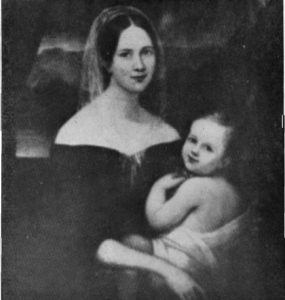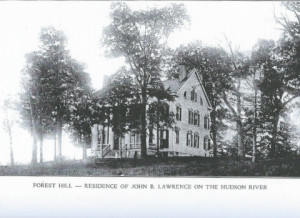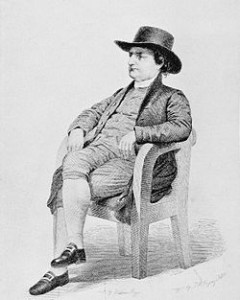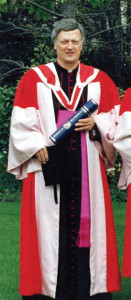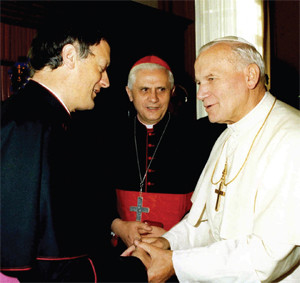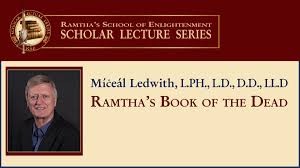Lydia Ann Lawrence was my wife’s third great grandmother. Born November 12, 1811, she was the daughter of Effingham Lawrence (1779-1850) and Anne Townsend (1782-1845). She first married a cousin, Edward Newbold Lawrence (1805-1839) on June 4, 1833, and from this union Frederick Newbold was born, and from him my wife is descended.
When Frederick was born, his father Edward wrote to his mother, Mrs. Effingham Lawrence, using the Quaker forms of address:
“It becomes my duty, my dear mother, to inform thee of the arrival of a young stranger this morning, in whom thee will doubtless feel an interest. My dear Lydia was this morning at 6 o’clock delivered of a fine boy. I say a fine boy, as the nurse and doctor both pronounce him so. He is judged to weigh full 15 pounds and looks bright and healthy….Lydia desires me to give her best love to thee and all the family.”
In 1836 an unknown artist painted a charming portrait entitled “Long Island Madonna and Child.” The painting was created in Bayside and the subject was none other than Lydia Ann Lawrence, a member of the Lawrence family, which played so prominent a part in the early history of Flushing and Bayside…. [The] infant son, pictured in the painting, is Frederick Newbold Lawrence (1834-1916).
Lydia as the Madonna
with the future President of the New York Stock Exchange
(The painting was in the house of Hortense Dixon (Cousin Tense), my wife’s grandmother’s cousin. My wife remembers visiting the house as a child and seeing the painting, but had clearer remembers of the pugs.)
Lydia was widowed, and on June 5, 1844 married another cousin, Cornelius van Wyck Lawrence (1791-1861), the first elected mayor of New York. Since was born a Lawrence, had as her first husband a Lawrence, and had as her second husband another Lawrence, she was Lydia Ann Lawrence Lawrence Lawrence. This was remarked upon:
A lady died on Saturday in Bayonne [in fact, Bayside], Long Island, who had been twice married, but never changed her name… She was a lady of remarkable grace and accomplishments, an authoress, her last book having been published only a few weeks ago. It was entitled “Do they love us yet?” and was a discussion of the relation of the dead to the living. She has had the problem solved more speedily than she had perhaps expected.
After Cornelius’s death Lydia took up spiritualism. She wrote on the subject for the Flushing Journal, which was run by her brother, Joseph Effingham Lawrence (about whom in another blog) and wrote a book, Do They Love Us Yet? (New York: James Miller, 1879).
Lydia recounts how her interest in Spiritualism arose. She received a message from her mother through automatic writing:
Your mother, my dear child, now writes to you – not from the grave, but from heaven. Angels, my daughter, clothed with light and love, have been permitted by a divine Providence to return to earth, and through the medium of a known law [emphasis in original] move with their dear friends, sounding heavenly echoes, telling them the grave need have no terrors, that death is a pleasant change, and that your mother still lives and loves and ever watches over you.
Lydia describes the circumstances:
During the time the medium was writing, raps sounded around the room on all sides – the table, wall , floor, etc etc – and from the time of receiving the above communication my interest in the subject has never ceased, and this little volume is the record that I have found to accord with the views harmonizing with the ideas of the future life, proving the natural and simple fact of a continued existence.
Many of these communications came at Forest Hill, the Lawrence summer house in upper Manhattan overlooking the Hudson, the current Fort Tryone Park.
Forest Hill, Site of the Rappings
This one is from “C.”, Cornelius, her husband:
“I hope, dear W. that you will be mild and love E. [Effingham] with all power. Remember I am with your spirit, loving always to hover around you. Mysterious as you may think it, my spirit is permitted by a divine Providence to come to you here at F. H. [Forest Hill] that place I spent so many happy hours gazing in the magnificent scenery, the work of God’s hands. Adieu.
The Lawrences were Quakers, and Hicksite Quakerism stressed the Inner Light as equal to Scripture. It was therefore a step toward continuing revelation and from that to Spirtualism, which
recognizes a continuing divine inspiration to man; it aims through a careful persevering study of facts at a knowledge of the laws and principles which govern the occult forces of the universe; of the relations of spirit to matter; and of man to God and the spiritual world.
Lydia had read in Deuteronomy
There shall not be found among you anyone who burns his son or his daughter as an offering,[ anyone who practices divination or tells fortunes or interprets omens, or a sorcerer 11 or a charmer or a medium or a necromancer or one who inquires of the dead, 12 for whoever does these things is an abomination to the Lord.
and had apparently been warned that evil spirits may try to lead men astray, but retorted:
I cannot imagine that the messages we have received, messages urging us on with the necessity of prayer and faith and holy living, could have come from Satan, or his must, indeed, be a falling house that is divided against itself; death, according to all spiritual teaching, being but another name for birth, the passing out of one stage of existence to another, one of the forms of progression.
(Effingham) used Quaker language in his good advice to Lydia:
Put thy trust in the ways of Providence, and it will support thee under all trails, which come to prepare us for heaven.
Lydia quotes communications on the Trinity, “received through the alphabet of raps” when “the medium was in a spirit or mesmeric trance.” It is mostly orthodox Christianity, with a Protestant tinge, but it also has this communication ;
The Holy Ghost is an influence proceeding from God and Christ, from the Father and the Son, from the soul and body of God, from the eternal essence and the eternal substance.
That is a very odd way of putting it, and sounds vaguely Mormon.
The book contains poems and remarks that establish the basis for spiritualism. Many poems reflect upon the relationship of the dead and those they have loved upon earth.
Mrs. Hermans’ Messenger Bird
But tell us, thou bird of the soen strain!
Can those who have loved forget?
We call – and they answer not again –
Do they love – do they love us yet?
Such poems are rarely of the quality of Rossetti’s “The Blessed Damozel.”
Some selections are about angels and their ministries upon earth. Others are from sermons:
In some way those we speak of and think of in heaven, love us still with all the old love of earth and all the new love of heaven together. So, because they love us still, we are all still one – our souls are in theirs and they in ours.
St. Cyprian preached at the time of a plague to comfort those whose families had died:
There await us a multitude of those whom we love – fathers, brothers, and children – who are secure already of their own salvation, and concerned only for ours.
William Channing spoke of heaven:
The departed…go to the great and blessed society which is gathered round him; to the redeemed from all regions of the earth.
Heaven has connection with all other worlds. It inhabitants are God’s messengers throughout the creation.
The good, on approaching Jesus, will not only sympathize with his spirit, but will become joint workers, active, efficient ministers in accomplishing his great work of spreading virtue and happiness.
So far so good, but then she quotes Swedenborg
All those who come from the world into the other life and extremely surprised at perceiving that they live and are men as they had previously been; at perceiving that they hear, see, and speak; at perceiving that their body enjoys the same sense of touch as before.
Other remarks sound Gnostic:
the body…is a prison, in which the soul, confined and pent up, is limited in its operation and impeded in its perceptions of divine things.
Although the spirits make pious remarks, they also implant the idea of a difference between the old religion , i.e., Christianity, and the new religion, Spiritualism:
From C.M. S. to L[ydia] A[nn] L[awrence]:
There are many waiting to be convinced, with mingled feelings of discontent with the teachings of the old religion and distrust of the new.
From C[ornelius Van Wyck Lawrence?] to L[ydia]:
You realize my idea of the connecting link between the ancient and modern religion, and how essential it is to have the unbroken thread of Inspiration taught from the earliest recorded time.
The new religion is scientific and based upon magnetism.
Lydia had read a book
filled with conversations held in a state of ecstasy between a clairvoyant and her guardian spirit.
Lydia understood that
Our own guardian angels and ministering spirits are understood to be the beatified dead, who have either known or loved us on earth are attracted to help us on our life journey through some subtle affinity of nature or character.
Many message are messages of comfort, or explanations why other spirits are not available:
From E[ffingham] Jr. (who died young) to Lydia:
I am happy now. Take this thought with you and remember it, dear aunt, when you feel tempted to grieve that I went away so soon. Uncle E. is with you often, but he has left his pen so long ago that it is not as easy for him to write as for me.
From her aunt E.T.L. Lydia received this message from a recent Quaker denizen of heaven:
I cannot commune more with thee tonight, as thee knows I have not been long an inhabitant of these lovely spheres, but I will try to come to thee again soon.
The spirits advises Lydia to adopt a Quaker attitude :
whenever thee desires to communicate with us, put aside all work and care and worldly thought, and wait [emphasis in original], as in the olden time we waited at our weekly meetings for whatever may come of the spirit.
I[saac} T. Hopper advises Lydia to let the spirits take her over, t control her, to use her as a mechanical instrument:
Good Friend: Thee has much power; shall I help thee see to use it rightly? Thee cannot be easily made a medium for individual communications. Thy brain is too busy with the world. Thee has too much to think of and for. If thee was young and careless now we could persuade through thee, write and speak also.
Thy magnetic power is good. We wish thee to use it in the right direction. Encourage the best mediums thee can find
____________________________________
A Digression on Isaac T. Hopper and Abolitionism
Isaac Hopper
Isaac Tatem Hopper (1771-1852) was a Hicksite Quaker who was active in the anti-slavery movement and the underground railroad. He moved from Philadelphia to New York in 1825 and opened a bookstore. He must have come to know the Lawrence’s, who were also active in the anti-slavery movement. In 1842 he became the treasurer and book agent for the New York American Anti-Slavery Society.
He was a good man:
He was one of the founders and the secretary of a society for the employment of the poor; a volunteer prison inspector; member of a fire company, and guardian of abused apprentices. Married and with a large family, he and his wife often extended their limited resources to take in more impoverished Quakers.
He also rescued blacks from slave hunters and kidnappers
As has been pointed out, in the religious controversy before the Civil war, the defenders of the legitimacy of slavery had a far stronger scriptural argument. Slavery is simply an accepted institution in both eth Old and New Testaments.
The Hicksite Quakers emphasized the role of the Inner light in interpreting Scripture, and this Inner Light led them to reject and condemn slavery as contrary to the inner meaning of the Scripture.
The Hicksite Friends were also actively involved in the formation of the American Anti-Slavery Society in 1833; Hicksites composed most of the Philadelphia Quaker delegation to the first convention of that society. Indeed, much of the abolitionist leadership as well as the rank and file came from the Hicksite Friends. Hicksites were also generally more willing to assist fugitive slaves on the Underground Railroad.
Orthodox Quakers were also anti-slavery and in favor of manumission, but Hicksites were far more active.
The reliance on the Inner Light seemed to give the Hicksites a higher moral standing as opposed to those who justified slavery on Scriptural grounds. So perhaps for Lydia teh Scriptural condemnation of mediums was weakened. If the surface meaning of Scripture was wrong about slavery, could it also not be wrong about mediums and communication with the dead?
____________________________________
From E[ffingham] L[awrence] to L[ydia] A[nn] L[awrence]:
You would be a good medium if you could have patience enough to sit quietly until we could obtain perfect control and use your hand to identify ourselves and prove our real presence, as we are all here living and loving as you have known us in days gone by
Perfect control?
What is going wrong here?
I think that the problem is not so much communication with the spirit world or communication with those who we love who are now in heaven, but with the use of mediums. God can certainly communicate with us, and he can let angels and the spirits of the departed communicate with us. But he does not use mediums to do this.
A Brief Excursus on Spiritualism
Two modern examples may make this clearer, and how dangerous such attempts are.
Vassula Rydén
Vassula Ryden is a Greek Orthodox seer who claims to receive and transmit messages from God through automatic writing. She has become popular, and even has theologians like René Laurentin defending her,and bishops and cardinals believing in her messages.
The Dominican Francois-Marie Dermine has analyzed the messages of Vassula Rydén, who claims to receive messages from God by automatic writing. These messages
present some contents capable of stirring feelings close to the heart: they in fact denounce the process of apostasy underway in the Christian world and the rationalism which has considerably contributed to rendering our faith boring, cold and insignificant. The messages reaffirm the existence of Satan and hell, and the dramatic aspect of the struggle between good and evil. They condemn abortion, New Age, reincarnation. They preach a message of radical conversion, fidelity to the Pope, the need to receive the sacraments and the importance of fast. They spread the devotion to the Sacred Hearts of Jesus and Mary, the practice of the Rosary also among the Orthodox followers, and encourage ecumenism by exhorting the Orthodox to unite with Rome.
They began in this way, according to Vassula. She claimed
I was making a list of expenses for a new cocktail party the same evening. At that moment I had this sheet of paper and I was writing what I had to buy for the afternoon. While I placed my hand with the pencil on the paper, all of a sudden I felt throughout my whole body some electricity that was coming into me through my fingers and especially on my right hand. Everything I held seemed like it was glued. The pencil no longer detached itself from my fingers. Even if I wanted to get rid of it, I could not lift it up anymore, I could not open my hand anymore. And the sheet of paper became like a magnet again. As if my hand was glued, I could not lift it anymore, as if my hand weighed 100 kilos, I could no longer lift it. All of a sudden an invisible force pushed my hand. I was not afraid, I do not know why. I relaxed my hand to see what would happen, and some words came, it was no longer my writing, and they said: “I am your angel […]. My name is Dan (Daniel).” He was soon replaced by Jesus Christ, by the Father, by the Virgin Mary or by other saints.
Dermine points out:
These modes of transmitting messages are and remain typical of the forms of mediumship (medium activity) present both in spiritistic circles, often disguised as “prayer groups” that make the claim of communications with the afterlife, and in neo-spiritistic New Age circles where they speak of channeling or communicating with “higher” spirits.
But this is highly, highly suspect. When God uses a person to transmit a person, he uses that person as a person, that is, a being with a free will and reason, not as a mere tool.
when He uses one of His creatures, the Creator does not ever deny Himself; He always chooses a suitable instrument, He respects its inner nature and – in the case of a human being – the vitality or the capacity of self-determination. As Karol Wojtila rightly says,
“It is never allowed to treat the person as a means. This principle has a totally universal scope. No one has the right to take advantage of a person, to use a person as a means, not even God its Creator. From God this is, on the other hand, absolutely impossible, because by endowing the person with a rational and free nature, He has granted him the power to assign by himself the purpose of his actions, thereby excluding every possibility of reducing him to being nothing more than a blind instrument to be used for the purposes of others.”
Cardinal Ratzinger when he was head of the Congregation for the Doctrine of the Faith issued this opinion:
the faithful are not to regard the messages of Vassula Rydén as divine revelations, but only as her personal meditations;
these meditations, as the Notification explained, include, along with positive aspects, elements that are negative in the light of Catholic doctrine;
therefore, Pastors and the faithful are asked to exercise serious spiritual discernment in this matter and to preserve the purity of the faith, morals and spiritual life, not by relying on alleged revelations but by following the revealed Word of God and the directives of the Church’s Magisterium.
Michaél Ledwith
The President of Meynooth
Michaél Ledwith was the president of Meynooth, the principal seminary in Ireland. The Pope John Paul appointed him a member of the International Theological Commission, which is charged with advising the pope on theological matters.
Ledwith advising Ratzinger and the Pope on how to contact the spirits.
Ledwith had been involved with sexual abuse in Ireland, and sexual abuse occurred in his new community. But there is an even deeper spiritual disorder. In the 1980s he became a disciple of JZ Knight, who is a medium who challes Ramtha:
“Ramtha”…is the name of a reputed entity whom Knight says she channels. According to Knight, Ramtha was a Lemurian warrior who fought the Atlanteans over 35,000 years ago.
The four cornerstones of Ramtha’s philosophy are:
- The statement ‘You are god’
- The directive to make known the unknown
- The concept that consciousness and energy create the nature of reality
- The challenge to conquer yourself
Ramtha’s teaching on sexual molestation is of special relevance to Ledwith:
“Thus the one who needs to molest and the one who needs to be molested—because he needs to understand it—are brought together for the experience. In the understanding called God, nothing is evil.”
In 2013 Melissa Genson, a reporter, recounted:
In 1988, JZ Knight told ABC’s 20/20, “If a person is ever sorry about what they ever did, then they will never learn, and they never progress and go forward.”
Those words must have had a ring to them.
The following year, Irish Monsignor Michael Ledwith began a double life, commuting half way around the globe to study under JZ Knight at Yelm’s Ramtha School of Enlightenment (RSE).
That was quite a coup for JZ Knight. At the time he joined RSE in 1989, Monsignor Ledwith was President of the National University of Ireland at Maynooth, and head of the National Seminary in Ireland. He was one of a small handful of theological advisors to Pope John Paul II. There was talk of him becoming Archbishop. He had risen very quickly through the ranks, and was still quite young for all his achievements.
Others in RSE’s 1989 beginners’ group, Ahk Men Ra, said that Michael Ledwith started off in the rank and file. Soon enough, though, his remarkable credentials quickly vaulted him into JZ Knight’s inner circle. He became one of RSE’s most esteemed teachers.
Other RSE students felt honored that such an important man was part of their fledgling school in Yelm. They felt that Michael Ledwith’s presence gave legitimacy to RSE and JZ Knight’s teachings. Invitations to dinner parties with Ledwith were eagerly sought. He regaled the other RSE students with stories of his adventures around the world, hobnobbing with the upper echelons of power and prestige.
It’s a good guess that Monsignor Ledwith had kept his connection to JZ Knight a secret from his other life in Ireland and the Vatican. Knight teaches that there is no right or wrong, that not even murder is wrong. That there is no good or bad. That you should think only of yourself.
All of that didn’t jibe with the teachings of Jesus, to which Ledwith had pledged his life when he was ordained as a Catholic priest in 1967.
It turned out that Monsignor Ledwith had other secrets in his life, besides RSE. Dark, ugly ones.
Secrets that, when finally revealed, made him a hated man in Ireland. The Irish press reported that Ledwith “fled” Ireland to come…here. Where JZ Knight waited with open arms. No more double life. He apparently needed JZ for real, this time. And she certainly knew how to make good use of him.
When Michael Ledwith’s dark secrets finally came to light, angry Irish citizens demonstrated against the Church leadership who had punished and banished a whistleblower priest many years earlier. That brave priest’s life was ruined when he had tried to report Ledwith’s ugly secrets in the early 1980s. Meanwhile, Ledwith’s career had skyrocketed.
These same secrets were later discussed on the floor of the Irish Senate, with the Minister of State in attendance.
In the years following his disgraced flight from Ireland, Michael Ledwith has appeared to lose touch with reality. He has also spoken with increasing bitterness about God, the Judeo-Christian ethic, the Bible, and even the Irish Catholic Church hierarchy that fiercely protected him for so long…and punished another, in his stead.
In the 1999 JZ Knight video The Two Paths, Michael Ledwith gives a rambling talk about how wine grapes are not native to planet Earth. He solemnly explains that the original grape vines were brought here 450,000 years ago by space aliens on UFOs. These space aliens hung around long enough to make wine and mate with the locals.
According to JZ and Ledwith’s teachings, the wine grape is not all that came here from outer space. JZ Knight has long taught that Jesus was actually a space alien who came here on a UFO, and who hated God just like she does. Ledwith agrees.
Both JZ and Ledwith shared the stage for two hours, and revisited the Jesus-as-alien theme during a March 2011 RSE “wine ceremony”—what participants define as pounding a lot of wine, bottle after bottle. And chasing it with tequila, cocaine, marijuana, and Prozac. Among other things.
Michael Ledwith had to be helped to his feet and guided to the stage for this 2011 joint presentation with JZ Knight. It was now seven hours into JZ’s sixteen-hour wine ceremony. Ledwith wobbled on unsteady feet in disheveled clothes, and he stared at JZ with glazed eyes. Once on stage, he held himself up by clutching onto the back of JZ’s throne.
At that point, though, Ledwith appeared to be holding up better than his hostess. JZ’s hair straggled around her face. Her make-up was streaking. Her words were slurred. Her sentences rambled nonsensically, and were laced with profanities, like “f-ck Jehovah.”
Once Ledwith was safely escorted onto stage, JZ returned to her teaching that Jesus really was an alien, who came to this planet to teach the opposite of what is in the Bible. JZ and Ledwith explained that Jesus actually came here to teach the same things that JZ Knight teaches, and that the Bible got it all wrong.
During their joint presentation, Micheal Ledwith called the God of the Bible “fickle, capricious, psychotic, neurotic, and insecure, and we are supposed to believe that He is the Creator God.” JZ added that God is a “psychotic, insecure son of a bitch,” and Ledwith laughed.
Such is the man who educated Irish seminarians and advised the pope.
Current Dangers
Spiritualism and New Age philosophies influence Westerners; in Africa and Latin America many are influenced by religions and cults that claim that human beings can become channelers of spiritual entities. So the challenge to orthodox Christianity is great, and has been largely ignored by theologians, who consider such phenomena as unworthy of their notice.
Lydia was preserved from the worst consequences of her dabbling in Spiritualism; other have not been so fortunate.
A vivid sense of the union of Christians on earth and the angels and saints in heaven is important, but it must be joined to caution because the spirit world contains enemies of the human race, who can disguise themselves as angels of the light and quote Scripture to their own purpose, to leas astray, if possible even the elect.
Hierarchical authority in the Catholic Church has almost always saw its function as pouring cold water on popular enthusiasm for visions, miracles, and superstitious practices. The clergy are often the most skeptical of any such claims. Some of them should be even more skeptical. I suspect they harbor doubts, and want “proof” that the spiritual world exists, or at least look for something that will awaken people out of secularism
The calls for placing the “lived experience “ of people on the same level as Scripture opens an unexpected and unintended door to varieties of Spiritualism: the experiences of spirits may be real (or at least experienced as real), but they must always be held to the standards that public revelation has set down, including the warning in Deuteronomy about mediums.
